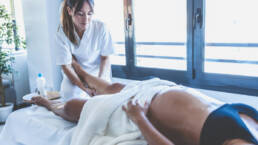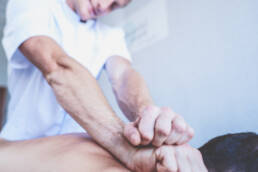Whether you’re a ballet dancer or a baseball player, athletic performance can send your spirits soaring and make you feel as if you’re nearing the peak of Mount Olympus. Unfortunately, it can also make your muscles feel tired, sore, and stiff. If you enjoy sports but could definitely do with less of the physical side effects, then sports massage is a worthwhile addition to your training regimen. The following information will explain why exercise is so hard on the muscles and how sports massage can help.
Exercise and Your Muscles
Competing in a triathlon or enjoying a long-distance hike can make you sweat and feel sore all over. When you suddenly overuse your muscles, it can make it difficult to continue with your planned workout. If you’ve tried correcting dehydration or one of the many other causes of exercise-related exhaustion and you still feel tired, you might just need to rest now.
By way of contrast, when it’s time to hit the lodge after a long day of skiing, it’s easy to feel elated and a sense of accomplishment. In fact, most of us don’t get sore until a day or two after strenuous activity. This is called Delayed Onset Muscle Soreness or DOMS, and it can seem to come from nowhere.
Muscle Recovery
Whether you have one or both muscular issues following activity, they both present muscle recovery challenges. In the case of overtraining or poor preparation, you need to pay more attention to nutrition and adequate hydration in addition to embarking on a balanced, gradual stretching and strengthening program.
When DOM is your primary issue, you need to do your best to support the muscle-rebuilding process. When you exercise, microtears form in your muscle tissue. As these tears heal, they produce a lot of inflammation to aid with the muscle-rebuilding process. Unfortunately, this produces some pain until the muscle tissue recovers and is rebuilt slightly larger.
How Sports Massage Helps Your Muscles
Sports massage does more than make you feel great all over, it promotes muscle recovery through a variety of mechanisms. Muscle cramps are sometimes due to dehydration.
If you’ve had a post-workout session electrolyte-based sports drink and you’re still in pain, you might benefit from better delivery of the sodium, potassium, or magnesium in your sports recovery beverage of choice. In this case, more of a good thing isn’t always the best choice, and chugging another sports drink can result in large quantities of urine filled with excess electrolytes.
Instead of flushing your effort down the toilet, you need to strategically move electrolytes into your muscles and other tissues requiring recovery. Sports massage can target these areas, providing warmth and increasing circulation to these areas.
In addition to your circulatory system carrying blood, your body also has a lymphatic system. The lymphatic system carries a clear fluid called lymph. Lymph is rich in white cells and other immune cells, which it brings throughout your body. This system also helps to remove cellular waste products from muscles and maintain your body’s fluid balance.
Another significant way sports massage helps muscles is by enhancing flexibility. Flexibility might seem like a rather unglamorous cousin compared to endurance, speed, or any number of performance indicators. After all, who has a trophy in competitive stretching.
There’s a reason that flexibility is not as popular as other markers of athletic prowess. Flexibility is the foundation of all athletic ability. Without flexibility, movement is limited. If you don’t believe me, think back to a time when you spent the weekend moving furniture or painting the nursery. If you’re not accustomed to moving your body in certain ways, it’s the flexibility that you’re missing that leads to muscular difficulties.
On the other hand, when you have excellent flexibility, your joints and muscles can move through their complete range of motion. When you’re only moving your body through a limited range of motion, it’s setting you up for an increased risk of injury due to repetitive motion.
Repetitive stress injuries, such as carpal tunnel syndrome, occur when joints only move through a fraction of their typical range of motion. As a result, muscles become tight due to unhealthy patterns of consistently constricted and limited movement.
When you’re more flexible, you’re able to gracefully move your joints through their complete range of motion. This results in exercising entire muscles and not just pathologically small portions of them. Athletic performance feels fluid, and motions are complete.
We can administer massage to help rehabilitate a variety of conditions including:
- Back pain
- Plantar fasciitis
- Knee pain
- Carpal Tunnel Syndrome
Although this list is very impressive and we’re glad that sports massage can be so helpful, the most important effect of sports massage is preventing injury in the first place. When your muscles and mind are relaxed, you’re less likely to sustain injury from athletic performance. When you have an injury, your body’s oxygen and nutrient delivery systems are optimized through regular massage so that your body’s full resources can begin repairing damaged muscles right away.
Recover Your Muscles With Sports Massage
If you’re intrigued by some of these research results or just want to know what sports massage can do for you, we’d love to speak with you. Our professional massage therapists are experts in a range of sports massage techniques and are happy to answer your questions. Whether you’d like to do more research or want a sports massage, you can also book an appointment with our Denver Sports Massage team at our Greenwood Village office.

With unique treatment plans tailored specifically to each individual, our goal is to offer a comprehensive approach to healing and reducing pain. We pride ourselves on taking a holistic approach to massage therapy for pain and are committed to providing the highest quality care. If you’re looking for a massage therapist in Denver to help with pain, schedule an appointment today!
Like this article? Spread the word!
Related Posts
October 11, 2024
Unleashing Your Potential: The Essential Role of Sports Massage Therapy for Weightlifters and Bodybuilders
Unlock your full potential as a weightlifter or bodybuilder with sports massage therapy…
August 15, 2024
How a Physical Assessment Helps: Unlocking Your Full Potential at Denver Sports Massage
Discover the importance of a physical assessment at Denver Sports Massage. Learn how our…
July 30, 2024
Elevate Your Soccer Game with Denver Sports Massage
Discover how Denver Sports Massage can help soccer players prevent injuries, improve…





